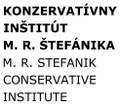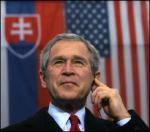
 Although Slovakia is more than 3,000 miles far and so different from the U.S., it is also well close. There are really a lot of differences. As far as its area concerns, Slovakia equals just to 0.5% of the U.S. territory; as far as its total economic product concerns, the ratio would be even lower (according to the data of 2004 it equals to 0.4% approx.). It is important to understand that Slovakia’s geopolitical weight is just one single drop in comparison with that of the U.S. Slovakia has passed throughout absolutely different historical experience and there are many differences in the attitudes of the citizens in both countries, while false myths are often the reason for these differences. Despite that, Slovakia and the United States are much closer to each other than ever before. At the highest level, this fact was proven during the visit of the U.S. president Mr. George W. Bush in Slovakia the last year.
Although Slovakia is more than 3,000 miles far and so different from the U.S., it is also well close. There are really a lot of differences. As far as its area concerns, Slovakia equals just to 0.5% of the U.S. territory; as far as its total economic product concerns, the ratio would be even lower (according to the data of 2004 it equals to 0.4% approx.). It is important to understand that Slovakia’s geopolitical weight is just one single drop in comparison with that of the U.S. Slovakia has passed throughout absolutely different historical experience and there are many differences in the attitudes of the citizens in both countries, while false myths are often the reason for these differences. Despite that, Slovakia and the United States are much closer to each other than ever before. At the highest level, this fact was proven during the visit of the U.S. president Mr. George W. Bush in Slovakia the last year.
Not only the changes related with the past in Slovakia or today’s (howsoever important) Slovakia’s membership in NATO caused the improved relationship between the U.S. and Slovakia. I am convinced, that the following common interest shared by the U.S. and the new European Union members, including Slovakia, is determinating this relationship more and more: the protection against the “spirit of socialism” and relativism emanating mainly under the European Union’s (EU) flag.
However, the prerequisite of real coalition between Slovakia and the U.S. consists in reduction of differences in the citizen’s attitudes to the basic ethical and economical principles. Like the people in the U.S., most of Slovak citizens are Christians. However, unlike the Americans, they are more enclosed in their faith and they participate substantially less in the help to the needy. It is not only that the voluntary solidarity in Slovakia is much lesser then in the U.S., Slovaks even do not perceive its importance and extent within American society. Also, Slovaks do not perceive the relation between conservatism and the free market principles. The communist propaganda in the past caused their strangeness for significant part of Slovaks even today. Therefore, a lot of Slovaks do not understand the American individualism based on the relying on one’s own effort instead of the “help” of others, mainly that of the government.
Unlike the U.S. with its more than two-hundred-year experience, Slovakia, after four decades of experiments with the real socialism, is standing just at the beginning of establishing of market economy with the “rules of the game”. Within Slovak society, still the individual freedom is not perceived with the individual responsibility and respect of property rights so strictly as it is in the U.S. Big difference persists in respect and protection of property rights, despite the fact that recently, in Slovakia appeared causes when the owners opposed the government consistently in order to protect their property.
However, not only the different perception of the individual freedom or private property constitutes an obstacle for better relationship. Also many false myths form such an obstacle. For example, the image of the U.S. in Slovakia still remains twisted due to the aftermaths of the communist propaganda. One of such myths says that the wealth of some Americans was achieved at the expense of other citizens. Thus, a significant part of Slovaks still disagree with the statement asserting that the income differences are natural and the government should not attempt to modify such differences. Similarly, an impression was given to Slovaks that the U.S. is an aggressive power, which is attempting to subdue the others. Therefore, unlike the official position of Slovakia, a significant (mostly elder and less educated) part of the population perceives with suspicion any U.S. military action abroad.
Also the voices coming from Western Europe and Hollywood’s films support the false anti-American myths. Therefore, the Americans are often perceived in Slovakia as less cultural, less diligent and being just more consumers. This is why the Slovaks are surprised when they read statistics, which say that, for example, the Americans work longer and have less holidays than the Europeans.
Despite all differences between Slovakia and the U.S., apparently those free market principles, which became the source of the U.S. wealth in 18th century – such as the competition, individual freedom and property rights – are being naturalized in Slovakia today; even more than in the “tired” Western Europe. Even such incomplete economic reforms as the tax reform in Slovakia may become a good example for both old EU members (except Ireland) and the U.S. Today, the ex-communist countries are leaders in tax competition and implementation of other measures in favor of market. However, they run up against the EU.
Slovakia and the other new EU member states are in paradoxical situation. After they have got rid of the real socialism and create the conditions favorable for market economy, they entered the EU, which restricts them using more hidden forms of socialism. Many forced regulations, for example, in the trade and labor markets, and mandatory standards give the business entities a hard time and increase their costs. Minimum social standards and minimum tax rates (e.g. the 15% V.A.T. rate as the lowest possible) together with the forced introduction of euro are another examples of unnatural unification of economic features and political centralization in the EU. The forced averaging of the life standard, its obstructed improvement as well as the limitation of the individual freedom are the consequences of such measures.
Moreover, the Union’s instability is increasing more and more. Either its further potential political centralization managed by the “old Europe” and based on the anti-Americanism, or its sudden break-up, with potential conflicts among the member states, would jeopardize not only these states, including Slovakia, but also the U.S. The experience with real socialism is the advantage of Slovakia and other countries of new EU members. So, their common interest shared with the U.S. becomes stronger and stronger: to convince the old EU members about the need of as much as possible non-socialist and market-oriented environment in Europe and the need of good trans-Atlantic co-operation. (Not only) therefore, Slovakia and the United States are much closer than it might appear on the first sight.
Author is an economic analyst for the Conservative Institute of M. R. ©tefánik.